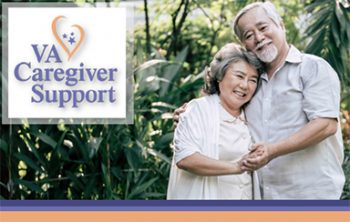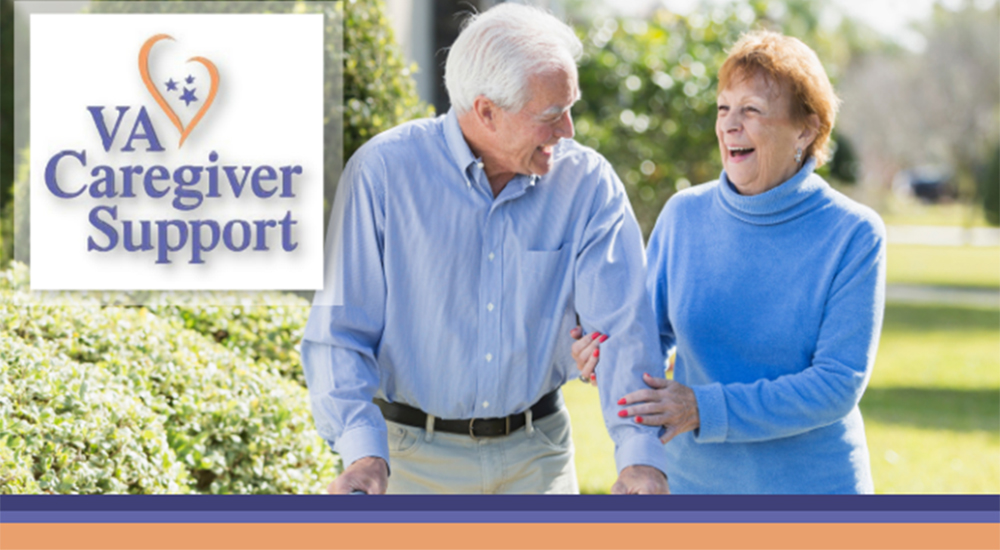Eva Blackburn has always grabbed life by the horns. She’s used to overcoming challenges with a positive attitude and nearly nothing getting her down. When she became her husband’s caregiver, she approached her new role with the same positive spirit.
Eventually, however, she began to feel overwhelmed and turned to VA for help. “I noticed a change in my husband and went to VA to see what type of assistance was available for him,” she said. “They told us about the Caregiver Support Program and they’ve supported us far beyond my expectation.”
Eva and her husband, Stanley, a Vietnam-era Veteran, are now participants in the Program of Comprehensive Assistance for Family Caregivers (PCAFC), a component of the VA Caregiver Support Program (CSP). They’re part of a new population of caregivers and Veterans who may now be eligible for PCAFC.
Now for Caregivers of Veterans who served before May 7, 1975
Established in 2011, PCAFC was implemented to provide resources to caregivers of eligible Veterans who served on or after September 11, 2001. On October 1, 2020, PCAFC expanded to eligible Veterans who served on or before May 7, 1975, including Veterans who served during the Vietnam era.
PCAFC supports Veterans by providing caregivers with education, training and connections to resources specific to the Veteran’s condition. Also, the program empowers caregivers and supports their wellbeing through services like self-care courses, support groups and respite care. Respite care provides Veterans with temporary caregiving services, allowing the caregiver to take time for themselves.
Inclusion of Serious Illness
Before the expansion, PCAFC criteria included Veterans who incurred a serious injury. Now, eligibility criteria include serious illness, as well.
“Expanding PCAFC criteria to include serious illness allows CSP to provide services in support of aging Veterans who depend on caregivers to meet their needs,” said CSP executive director Colleen Richardson. “It also allows us to help caregivers who are making a significant sacrifice to care for the Veteran and themselves.”

The program is expanded to eligible Veterans who served on or before May 7, 1975, including Veterans who served during the Vietnam era.
Since PCAFC’s expansion in October 2020, more than 4,000 Veterans age 60+ have applied and had a caregiver approved by the program. Like Eva, many caregivers within this demographic are supporting Veterans with co-morbidities or the presence of two or more medical conditions.
“Stanley has been on dialysis since 2009,” Eva said. “In 2017, he suffered a stroke and then became dependent on a walker in 2019. This program has made it possible for me to provide the care he needs. I’m blessed I’m able to take care of him and that he doesn’t have to go to a home.”
Preparing for a New Program
With the expansion of PCAFC, the Caregiver Support Program has increased staffing to meet growing program interest. More than 1700 full-time staff have been hired to ensure all caregivers and Veterans receive the same quality care and support level.
For Eva, the staff have been an actual support system. “I’m usually not the type of person to ask for help,” she said. “But it’s so nice to know there is someone you can reach out to when you need them. The program’s social workers have been that for me.”
Support for all Veterans’ caregivers
Caregivers of Veterans who are not eligible for PCAFC can still receive services and resources through CSP’s Program of General Caregiver Support Services (PGCSS). PGCSS helps caregivers of Veterans of all eras enrolled in VA health care and offers a wide array of services to family and friends who care for Veterans.
These services include online courses, face-to-face classes, coaching, skills training, telephone support and peer support. Every VA facility has a CSP team who can assist with information and referrals, including more about PGCSS. Caregivers can locate their VA facility’s point of contact online.
Caregiver Support Program Resources
Annie Caregiver Text Support is VA’s text messaging service that promotes self-care for caregivers. Caregivers need a phone capable of text messaging to enroll.
Building Better Caregivers TM (BBC) is a 6-week online workshop for caregivers of Veterans of all eras. The BBC helps caregivers in two keyways: training in providing better care and assisting caregivers in managing their own emotions, stress and physical health.
Caregiver Education Calls are monthly telephone calls for caregivers with a theme of “Care for the Caregiver.” The topics change monthly, and presentation materials can be found on the CSP website.
Caregiver Support Coordinator (CSC) can link you to essential resources and services available to you, as a caregiver, and to the Veteran. Find your local CSC today.
Caregiver Support Line (CSL) offers support by caring licensed professionals. The CSL, 1-855-260-3274, is available toll-free 8 a.m.- 10 p.m. E.T., Monday through Friday, and 8 a.m. E.T., Saturday.
Caregiver Support Program Website contains tips, tools, videos and links to resources for caregivers of Veterans of all eras.
Resources for Enhancing All Caregivers Health (REACH VA) Intervention is an evidence-based intervention that is delivered by VA clinical staff to provide individual support to stressed and burdened caregivers of Veterans of all eras.
Don’t miss a thing. Subscribe to our Email Updates
Elsie Moore is the National Caregiver Support Program manager for training and education.
Topics in this story
More Stories
The Medical Foster Home program offers Veterans an alternative to nursing homes.
Watch the Under Secretary for Health and a panel of experts discuss VA Health Connect tele-emergency care.
The 2024 National Veteran Suicide Prevention Annual Report provides the foundation for VA’s suicide prevention programs and initiatives.







Her health care is Champas and medicaid
Please apply to the new program theres financialassistance bless you hardest thing ive ever done care for another un well person ❤
My husband is a gulf war veteran who served in the 1st gulf war, active duty, combat veteran. Honorably discharged. Battling several severe conditions. Some are SC, he’s batting sarcoma since 2016. We have been denied aid & attendance several times. Now in hospice after fighting for sufficient help and care after serving his country honorable. We don’t need another training program to attend. We need financial assistance to help us pay our bills and survive. I’ve been his full-time caregiver since 2015, and no longer able to work due to his extensive care. He is 61 years old. Can we qualify for aid & attendance now? Please advise.
Thank you.
God knows I need help. Bad back. Bad health.
What about the spouse of a Vietnam veteran, who died of complications of agent orange and he was awarded death caused by military service from Vietnam erra at 100%. Now the spouse has dementia, cancer and more. Her daughter is caring for her full time. She has campus Healthcare. Does the VA help pay for her care.